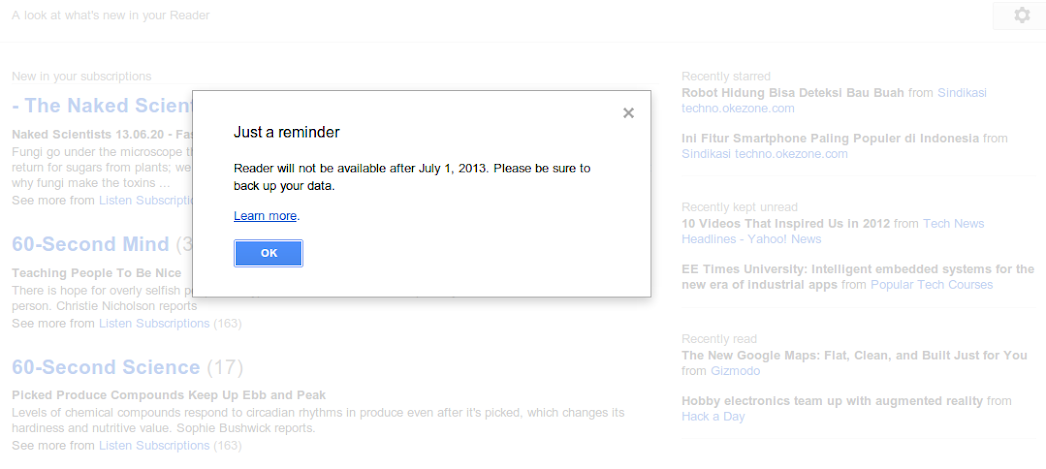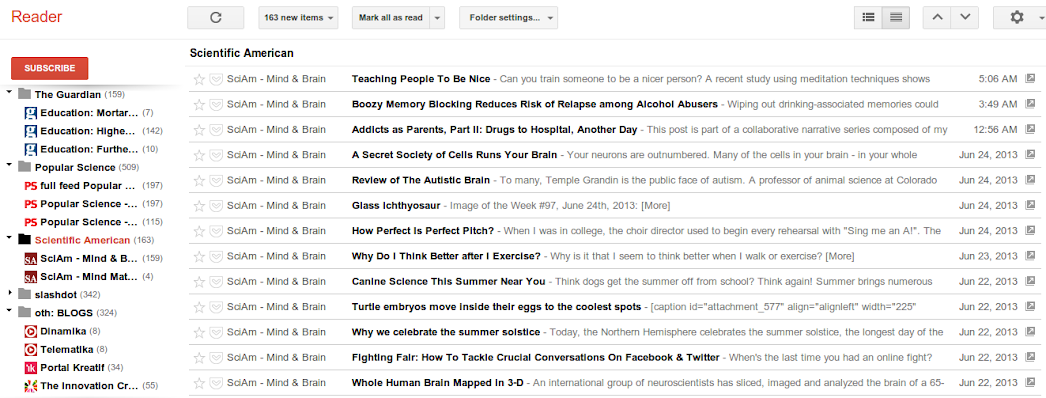Posts Tagged ‘technology’
5 Suggestions for Better STEM Education, From Students [full article]
Although demand for workers with STEM qualifications has only grown in recent years, a minority of students elect to pursue science, technology, engineering, and mathematics in high school and college. To spark a discussion about how US schools can motivate more students to The USA Science and Engineering Festival brought together its youth advisors for a Twitter chat on April 17th. During the discussion, several themes emerged — suggestions about how to improve STEM education from the very people who stand to benefit from that training.
Schools are focusing too much on memorization and not enough on problem-solving, killing student interest in STEM topics early.
“It would be great if schools allowed kids to solve real problems, to learn by doing,” said Erik Martin. “My education did not aid interest, or work at all—huge failure there.”
In contrast, he says “making games is a great way to get into the tech space!” He knows this firsthand; in his 2013 TEDxRedmond talk, “How World of Warcraft Saved Me and My Education,” Erik described finding resilience, curiosity, and courage in gaming that he’d never had the chance to find in school.
“The most wonderful of art forms – from the resilient tardigrades to the billions of neuronal connections that we call consciousness, fascinate me. But sometimes, that beauty can disappear,” said Omar Abudayyeh, a Harvard MD/PhD student, commenting on the vast stores of information that medical school forces students to commit to memory.
To provide those opportunities for problem-solving, schools need to let students conduct science research projects—early and often.
“Student-led research is better than the current ‘bulimic’ education system which advocates rote memorization,” said cancer researcher — and high school student — Jack Andraka. Jack found his first research opportunities outside of school by contacting hundreds of university professors for lab space. Param Jaggi, founder of a green tech startup, said, “Learn by doing. Education should not be restricted to a classroom or a textbook. Some science and tech concepts only come to life in the lab.”
Grown-up teachers aren’t the only teachers in the room—peer-to-peer learning can be leveraged for incredible gains in STEM education.
This semester I took my first-ever Computer Science and Engineering class. As I squinted at seemingly incomprehensible lines of C, shook my fist when code failed to compile, wrestled with wires, and tried to learn all the curves and edges of my Arduino, my saviors weren’t my teachers or even Wikipedia—they were my classmates. Peer-to-peer learning is powerful. Yet, as Erik Martin said, “peer-to-peer is something educational technology often overlooks.”
Schools need to approach science education as more than a way to prepare future doctors and engineers; STEM is about satisfying human curiosity.
I’ve oftentimes described myself as a “humanities kid.” It was easy, convenient, and gave me the peace of mind I needed to tune out during biology lectures with the attitude “I’m not going to be a scientist, so why bother?” I realized later that STEM was about more than creating future scientists, but school rarely gave me a compelling “why care” for science that didn’t have to do with career paths.
As Jack Andraka said, “science satisfies the innate curiosity of humans—however, schools do not teach it this way.” This rings true with me. I pushed away mathematics textbooks and evaded AP science classes until my senior year. It was only innate, human curiosity that made me interested in STEM—it was asking questions, making cool things happen with code, and falling in love with the universe the nights as I watched meteor showers streak across the sky.
Failure is life’s built-in educator
“Failure is sometimes necessary and unavoidable, and most often there’s a lesson to be learned that can be applied towards achieving future success,” said Parker Liautaud, a leader of polar research expeditions. “For me, not reaching the North Pole was by far the worst failure of my life.” Despite the important role of failure in life, school and society tends to “put everything into two boxes: success or failure. But I believe there’s a third box and it’s called Not Trying,” remarked UC Berkeley University Medalist Ritankar Das, during his address to Cal’s Class of 2013 graduates. At 18, he was Berkeley’s youngest top graduating senior in a century. He went on to say, “Fundamentally, everyone harbors great ideas, yet most of us ignore them out of fear of failure.”
Although not everyone is a classroom teacher who can change the way a student learns on a day-to-day basis, anyone with access to technology can pitch in to help mentor the up-and-coming scientists and engineers of the future. Through sharing personal stories of success (and failure!) in STEM to encourage young people, and offering mentoring via email, Google Hangouts, or other mediums, adults around the world can help reimagine STEM learning and teaching, one inspired student at a time.
Selamat tinggal Google Reader
Konon tiada pesta yang tidak akan usai. Sebaik apapun suatu produk komersial dari segi teknis, jika tidak menghasilkan cukup keuntungan maka akan berpotensi untuk dihentikan keberlangsungannya. Mungkin itu yang akan dialami oleh Google Reader, suatu aplikasi pengumpulan berita yang berbasis RSS.
Dunia terus bergerak, terus berubah walaupun kadang bergerak dalam lingkaran :-). Berikut sekelumit kenangan dengan Google Reader.

Sebentar lagi “pesta” akan resmi berakhir.
- Kumpul-kumpul dalam satu “keranjang” yang tertata rapi.

Karena jatah waktu harus dibagi-bagi untuk aktifitas yang lain.
Links:
+ http://www.google.com/reader/view/
+ http://en.wikipedia.org/wiki/Google_Reader
+ http://lifehacker.com/google-reader-is-shutting-down-here-are-the-best-alter-5990456
+ http://gizmodo.com/10-google-reader-alternatives-that-will-ease-your-rss-p-5990540
+ http://techcrunch.com/2013/06/24/there-is-no-google-reader-replacement-only-alternatives/
Watch “Malcolm Gladwell: The strange tale of the Norden bombsight” on YouTube
Posted from WordPress for Android



